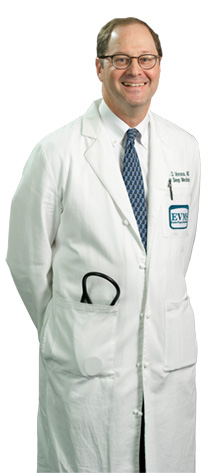 Medical Director, EVMS/SNGH Sleep Disorders Center
Medical Director, EVMS/SNGH Sleep Disorders Center
Dr. Robert Vorona likes to say he approached his career in sleep medicine backwards. After graduating with a degree in psychology at Duke in 1977, he earned his medical degree from the University of Virginia in 1981. He completed a residency in internal medicine at the University of Michigan at Ann Arbor, and a pulmonary fellowship at University of North Carolina at Chapel Hill.
Following his fellowship, he joined Pulmonary Medicine of Virginia Beach in 1986, practicing with Drs. Bruce Johnson and Bill Cooper. Dr. Johnson had become Board certified in sleep medicine, and suggested that Dr. Vorona do likewise. “I had been introduced to sleep medicine at Carolina and became interested in it while doing a small research project,” he says. Practicing pulmonary, critical care and sleep medicine, he stayed with the Virginia Beach practice for 10 years before relocating to Winston-Salem in 1996 to join Winston-Salem Health Care, where he practiced internal medicine, pulmonology, and sleep medicine.
He might have stayed in North Carolina, but for an invitation from Dr. J. Catesby Ware (Division Chief) and Dr. Leon Georges, then Chairman of Internal Medicine at EVMS. Recognizing Dr. Vorona’s clinical skills and academic potential, Dr. Georges recruited him to become the Medical Director of EVMS Sleep Medicine. He accepted, with the proviso that he would spend a percentage of his time working with Drs. Cooper and Johnson. “Initially I was at EVMS about 80 percent of the time, and with my old partners about 20 percent,” he recalls. “But eventually, the opportunities at EVMS became my entire focus.”
Those opportunities include patient care – he sees patients four days out of five – and still finds it interesting that some in Hampton Roads do not know that the medical school cares for patients. His responsibilities also involve rewarding educational interactions with medical students, medical and ENT residents, practicing physicians from a variety of specialties, dentists, oral surgeons and sleep technologists. The medical school environment allows more opportunities for sharing current knowledge; for example, he says, “We meet every Tuesday morning in a multidisciplinary fashion to review a recent article in the sleep medicine literature, and to discuss challenging cases.”
Dr. Vorona devotes 10 percent of his time to performing research with his fellow specialists, students and mentees. There is plenty to research, as sleep medicine is still a relatively new field. “It’s been interesting to see the field grow from the standpoint of the number of sleep medicine specialists who come from different disciplines,” he says, “and the increase in knowledge.” An example of the maturation of sleep medicine is the development of sleep fellowships. In 2011, Dr. Vorona and EVMS colleague Ms. Etta Vinik, MA, medical educator at the Strelitz Diabetes Center, developed the Commonwealth’s first Accreditation Council for Graduate Medical Education (ACGME) accredited sleep medicine fellowship.
The first fellow, Dr. Steven Kanarek, a neurologist, completed his fellowship in 2014. The second, Dr. Ubha Rayamahji, a psychiatry resident, finished in 2015. The third, a pediatrician, will begin in July 2016. Because sleep disorders can have many different etiologies, Dr. Vorona appreciates working with fellows with different backgrounds than his. “I have found it personally interesting, because while I’m teaching them, I’m also learning from them.”
In 2008, Dr. Vorona and Dr. Richard Parisi of Richmond spearheaded the development of the Virginia Academy of Sleep Medicine, an education/advocacy organization that serves as the voice of sleep medicine professionals in Virginia. VASM’s first educational conference was in 2009, an annual event that today attracts attendees from across Virginia and beyond. VASM successfully lobbied for the licensing of polysomnographic technologists, a key step in the development and maintenance of standards for the field of sleep medicine. Dr. Vorona now serves a second term on the Governor’s Board of Polysomnographic Technology.
One research interest for Dr. Vorona is the role of obesity in sleep disorders. A 2005 study of approximately 1,000 patients demonstrated a strong relationship between obesity and sleep duration; in a follow-up study, he is collaborating with Dr. Ware on the relationship between objectively measured sleep and body mass index.
A main area of recent focus is the potential negative consequences of early high school start times. Dr. Vorona, Dr. Ware and Dr. Mariana Szklo-Coxe of ODU first compared two similar Tidewater communities with starkly different high school morning bells, and found that students who started school earlier were involved in more automobile crashes than the students who began later. Dr. Vorona and colleagues recently replicated these findings with two matched Central Virginia school districts, and they continue to explore this area. These studies are rewarding to him, as they may have public policy ramifications for the Tidewater region and beyond.
Over the course of his practice, Dr. Vorona has given presentations at international, national and local conferences on sleep disorders, their relationship to other medical conditions, and the growing field of knowledge today’s practitioners can bring to bear to help patients. It’s a far cry from when he began. For example, he says, “When I first joined Pulmonary Medicine of Virginia Beach, Bruce Johnson and I would try to convince our colleagues and patients that sleep apnea was important, but there was skepticism, perhaps rightly, as sleep medicine was still in its relative infancy. Today we know that treating apnea and other sleep disorders improves sleep and quality of life, lowers the frequency of car crashes, lowers blood pressure, and probably protects the cardiovascular system as well.”

